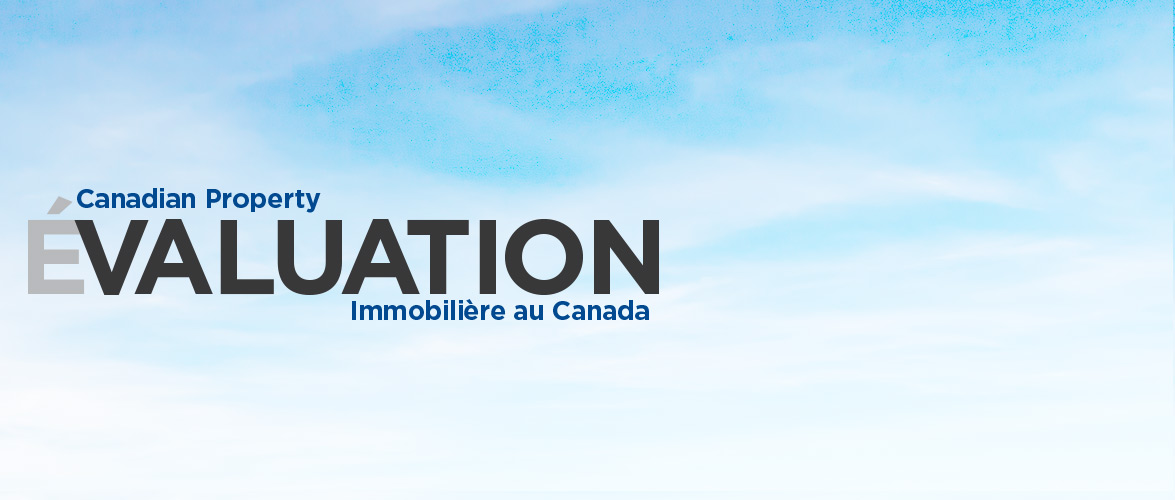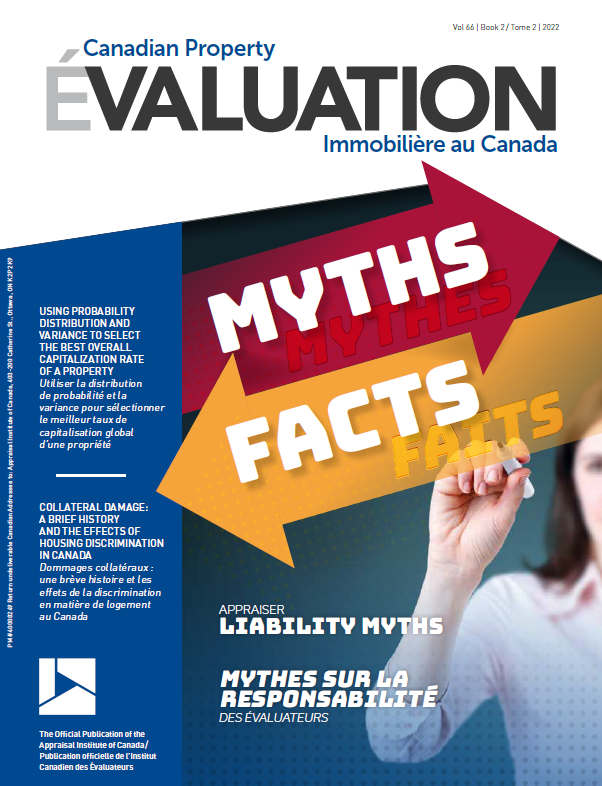Expert witness immunity
Canadian Property Valuation Magazine
Search the Library Online
By John Shevchuk, AACI(Hon), Barrister & Solicitor, C.Arb, RI
On past occasions, I have written about the state of the law in Canada regarding the duty an appraiser retained as an expert witness owes to the court, the administrative tribunal or the arbitral tribunal before which the appraiser appears. I expect appraisers are well aware by now that an expert witness must avoid advocating for any party in a proceeding. Experts have a primary duty to the court or tribunal to be fair, objective and non-partisan when providing opinion evidence.1 Some jurisdictions in Canada have
codified this requirement.2
However, there is another aspect of the role of an expert witness that is worthy of discussion, namely, expert witness immunity. Is it possible for an unhappy litigant to sue an expert witness in connection with the evidence given? To what extent is an appraiser protected from claims of breach of contract or negligence in the performance of expert witness services? Does it matter if the unhappy litigant is the party that retained the expert witness rather than the opposing party? This issue was recently canvassed by the Ontario Superior Court of Justice in The 6th Line Mofos Limited v. Stewart, 2022 ONSC 520 [Mofos].
The facts and issues in Mofos
In Mofos the relationship of two co-owners of real estate became litigious and it was decided that the buyout mechanism in their co-tenancy agreement would be exercised. The process provided for the purchase by one co-owner of the other co-owner’s interest for 85% of the appraised value. The co-owners could not agree on the purchase price and so, under the buyout mechanism, each co-owner obtained an appraisal of the property and the end value was to be determined by averaging the two appraised values. When the appraisals were exchanged, Co-owner A objected to the methodology utilized by Co-owner B’s appraiser and refused to close the transaction. This led to the co-owners submitting to binding arbitration. Among other things, the arbitrator found that the appraisal prepared by the appraiser retained by Co-owner B did not qualify as an appraisal under the buyout mechanism, with the result that the lower appraisal from Co-owner A’s appraiser set the price for the buyout. Subsequent to the arbitration, both co-owners sued Co-owner B’s appraiser. Co-owner A sued the appraiser for the unrecovered costs incurred in having to go through the arbitration process. Co-owner B, who had retained the appraiser, sued the appraiser for breach of contract, negligence and breach of fiduciary duty. In the end, the court held in favour of the appraiser. Co-owner A’s claim for costs incurred in the arbitration process was dismissed on the basis of expert witness immunity. Co-owner B’s claim against the appraiser was dismissed because, on the evidence adduced, no breach of contract in rendering the expert witness services was established.
The case provides an interesting review of several issues, including the distinction between the duty of care under the law of negligence and breach of the obligations of an appraiser under the Canadian Uniform Standards of Professional Appraisal Practice (CUSPAP), the duty of care that might be owed by an appraiser to third parties despite a general disclaimer in an appraisal report and, the focus of this article, expert witness immunity.
Expert witness immunity described
At paragraphs 105 and 106 of Mofos, the court wrote the following:
105 The doctrine of witness immunity precludes the bringing of a civil action based upon harm alleged to be caused by a witness’ testimony. It is a principle well-entrenched in our law.
106 There are various rationales for this doctrine: 1) to encourage witnesses to testify freely and without fear of consequences to themselves; 2) to protect witnesses from being harassed by unjustified claims from dissatisfied litigants; 3) to prevent a collateral attack on issues already tried, fostering finality in judicial proceedings; and 4) to encourage expert witnesses to testify in judicial proceedings, so as to protect against a shortage of experts willing to testify and a resulting rise in cost to retain experts for that purpose.
Extent of expert witness immunity
Although expert witness immunity is well established, a limited exception to the immunity has been recognized related to fees for services rendered where the party retaining the expert establishes breach of contract or negligence by the expert preparing for and testifying in the proceeding.
In Mofos, Healey J. referred to the United Kingdom Supreme Court decision in Jones v. Kaney, [2011] UKSC 13 [Jones] in which expert witness immunity was abolished for a party suing its own expert in negligence. Healey J. noted that Jones is not the law in Canada.
Healey J. also referred to the decision in Paul v. Sasso, 2016 ONSC 7488 [Paul] that illustrates how the immunity operates in Canada. In Paul, the defendant expert was retained by the plaintiff to provide expert evidence in a share valuation dispute. In the valuation trial, the expert’s testimony was rejected and adverse findings regarding the expert’s credibility were made by the court. Subsequent to the trial, the unhappy client sued the expert for negligence and breach of contract and the expert counterclaimed for unpaid fees. The client defended against the counterclaim by alleging breach of contract and negligence on the part of the expert when preparing and giving his evidence.
The expert brought an application seeking a) to have the client’s action dismissed, and b) judgement for unpaid fees invoiced for services rendered. The court dismissed the client’s action on the ground of expert witness immunity. However, the court held that the client was not precluded from alleging breach of contract on the part of the expert as a defence to the claim for unpaid fees.
On the issue of expert witness immunity, the court wrote the following:
16 Our courts have long held as a fundamental principle that witnesses and parties are entitled to absolute immunity from subsequent liability for their testimony in judicial proceedings, since the proper administration of justice requires the full and free participation of witnesses unhindered by fear of retaliatory suits… The privilege extends to evidence orally or in writing, it includes documents properly used and regularly prepared for use in the proceedings, and is not limited to defamation actions, but extends to any action, however framed… The privilege has been applied in particular to expert reports and evidence given based upon the report at trial…
17 I can see no principled reason why the privilege should be confined to adverse witnesses. The policy of the common law to ensure that all witnesses are able to give their evidence free of fear of retaliatory law suits is not diminished when considered from the perspective of a party’s own expert witness. To the contrary, the very strong policy of the common law has been that a party’s own expert must be objective and not become a ‘hired gun.’ Rule 53.03(2.1) of the Rules of Civil Procedure requires an expert to certify his or her understanding of the duties of an expert.
With respect to the counterclaim, the court stated:
34 It is clear that the breaches of duty alleged by the plaintiffs (defendants by counterclaim) go to the root of the retainer of [expert]. I am of the view that witness immunity can properly be used as a shield by [expert] to avert liability on the plaintiff’s claim, but cannot be used as a sword by [expert] to preclude the Pauls from defending [expert’s] counterclaim on the basis of the alleged breaches of contract and negligence. The policy grounds that prevent the plaintiffs from suing their own expert witness for consequential damages are of no application to defending a claim for professional fees brought by an expert witness… If properly demonstrated, these breaches may well provide a defence to some or all of the damages claimed by [expert].
In Halpern v. Morris, 2016 ONSC 7855 at paragraph 32, the court observed that the extent of expert witness immunity is uncertain, based on present case law. It seems clear that claims against an expert witness for consequential damages arising from the expert’s evidence will be prevented by expert witness immunity, but courts will resist applying the immunity to situations where the party retaining that expert attempts to hold the expert to account for breach of contract or for negligence in the performance of expert witness services. At paragraph 33 in Halpern, the court alluded to the problems that could arise if the immunity is extended absolutely between client and expert:
33 If the conclusion, reached by the Deputy Judge in this case, is correct, its logical extension would be that an expert could not be sued by her/his client, even if the expert manifestly failed to properly perform their duties as an expert. Suppose, for example, an expert ignored a basic principle applicable to their expertise and thus rendered a report, and provided evidence, that was useless to the parties and to the court. Should the person who paid for that work be denied the right to recover the fees? Similarly, suppose it could be demonstrated that the expert fraudulently inflated the hours that they spent, and consequently their fees, for the work done. Should the person who paid for that work be denied the right to recover the fess, or at least the overpayment? It does not seem to me that any of the justifications offered in support of expert witness immunity would justify such a result. As Lord Kerr said, in his concurring reasons, in Jones v. Kaney, at para. 88:
It has not been disputed that an expert witness owes a duty to the client by whom he has been retained. Breach of that duty should, in the normal course, give rise to a remedy.
In other words, an expert cannot be sued by an opposing party in a lawsuit or by the party retaining the expert for losses arising out of the rendering of the expert witness services, but nor can the expert successfully claim for unpaid fees if there has been a breach of contract or negligence in the performance of expert witness services and the client can maintain a lawsuit to recover fees paid in such circumstances. The court in Mofos at paragraph 128 wrote to similar effect:
128 These cases lead me to conclude that expert witness immunity remains intact in Canadian law. It bars a suit against an adverse expert witness for consequential damages arising from that expert’s report and/or testimony, absolutely. With respect to a litigant’s own expert, the only ‘crack’ in that immunity may be for claims for an expert’s fees.
Closing
As the law stands in Canada, it appears that:
- expert witness immunity arises upon an appraiser’s engagement to provide expert witness services;
- under the immunity, an expert witness cannot be sued for consequential damages a party to litigation suffers from the expert’s testimony; and
- the party retaining the expert witness may resist paying the expert for services rendered or recover payment for such services if the expert breached a contractual duty or was negligent in the performance of the expert witness services.
End notes
1 White Burgess Langille Inman v. Abbott and Haliburton Co., 2015 SCC 23
2 See for example British Columbia Supreme Court Civil Rules, B.C. Reg. 168/2009, Rule 11-2; Ontario Rules of Civil Procedure, R.R.O. 1990, Reg. 194, Rule 4.1.01; Civil Procedure Rules of Nova Scotia, Rule 55.04, Arbitration Act, SBC 2020, c. 2 section 35
This article is provided for the purposes of generating discussion. It is not to be taken as legal advice. Any questions arising from this article in particular circumstances should be put to qualified legal and appraisal practitioners.





